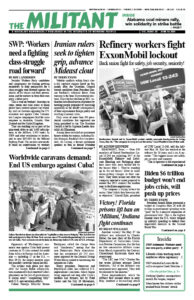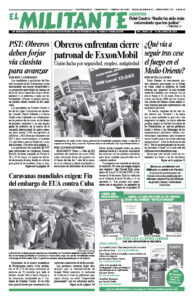MANCHESTER, England — Bosses at Go North West “wanted to take a lot, but we’ve clawed a lot back and have got a stronger union that they have to deal with,” Carl Walmsley, one of hundreds of striking bus drivers, told the Militant. They had voted to return to work and end their 11-week strike. The strike “was most definitely an achievement.”
The drivers, members of the Unite union at the Queens Road Depot here, beat back an attempt by the company, Go North West, to deal a blow to their union and erode working conditions. Their action won support from working people facing similar assaults in Manchester and beyond.
Some 400 drivers went on strike Feb. 28, after bosses tried to bypass their union and force workers to sign individual contracts, threatening to fire those who didn’t. The terms would have imposed longer working hours with no pay increase, and an attack on sick pay.
“Go North West wanted to eliminate union bargaining rights,” picket organizer Paul Jenkins said.
For the duration of the strike hundreds of workers would join the picket lines at a busy Queens Road intersection north of the city center. A solidarity delegation of trade unionists from Rolls-Royce, who recently struck and pushed back job cuts at its Barnoldswick plant, was an early indication that this fight would become a magnet for other workers offering solidarity. Bus drivers and workers from many parts of northwest England would bring workplace collections and messages of encouragement.
Two solidarity demonstrations were organized, drawing hundreds from across the region. A local Asian family regularly cooked curries for the strikers’ kitchen, and a teacher at a local Jewish school brought their class to the picket line to learn about the strike.
The drivers twice sent delegations to join striking gas workers facing a similar threat from British Gas bosses: that they would be fired if they didn’t sign onto worse conditions.
In response to the strike, bosses deepened their union-busting course, organizing with other transport companies and some 80 strikebreakers to run buses, firing two strikers and filing disciplinary charges against 36 others.
When talks broke down in early April the strikers continued to hold their ground.
In the face of the strikers’ refusal to pull back, the bosses began to crumble. By the end of April they agreed to talks, promising to reinstate drivers they sacked, to withdraw the threat to fire others who didn’t sign the individual contracts bosses wanted, and to drop all disciplinary moves.
“The company had wanted total control of our job rosters,” Walmsley said, “so they could do what they want. Bosses have now agreed that they have to consult and negotiate with the union. They can’t just impose a roster. ”
The company also pulled back on moves to cut sick pay to 60% of wages and will put it at 90%. The contract included a 2% pay raise. Strikers say some concessions were agreed to on breaks, and walking and clocking-in times.
Following a May 17 mass meeting, strikers voted by 78% to return to work. “The deal is considerably distant from what we had faced,” Colin Hayden told the Militant. “There are some issues we did not manage to get back, but they now become an issue inside the workplace.”
“This victory for union power sets an example,” said Pete Clifford, a rail worker who joined the picket line with co-workers from Manchester Piccadilly station, and a leader of the Communist League.
“For the last year, bosses have used lockdown conditions and fear of job losses to deal blows to the unions and assault workers’ pay and conditions.
“The sustained character of the bus drivers strike and the solidarity it generated shows it is possible to fight and strengthen the unions,” Clifford said.

